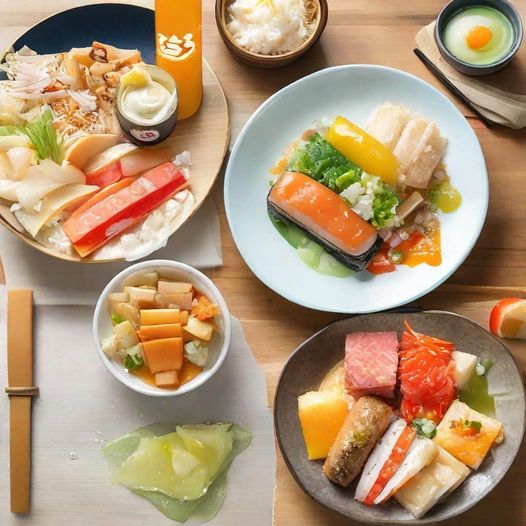Does Japan have the answer to the WORLDS obesity crisis?
Nutrition, May 12, 2024
The standard western diet is a major contributor to our obesity crisis and deteriorating wellbeing. The saying "you are what you eat" has never carried more weight.
In the overly stressed rush of modern life, the quest for healthy eating seems like a herculean task. Temptation lurks at every street corner in the form of greasy tasty fast-food outlets while grocery store aisles are veritable treasure troves of ultra-hyper processed snacks. It's no surprise that New Zealand’s adult obesity rates have soared to a staggering 32.8%, and Australia is 31% # with many affluent nations on par. Amidst this health crisis, pharmaceutical solutions like Ozempic have become global best-sellers, as the world grapples with the weight of its excesses. But not every nation is succumbing to this trend. A world away in Japan, the situation is starkly different, prompting one journalist's journey to uncover the secrets of a country seemingly immune to the obesity epidemic.
Central to the Japanese approach to cuisine is the art of subtlety. Contrary to Western culinary practices, which often focus on enhancing flavors through the liberal use of additives like butter and salt, Japanese cooking is about simplicity and purity. It aims to highlight the natural taste of ingredients, employing minimal enhancements to bring out their inherent flavors. This philosophy extends beyond mere taste; it reflects a deeper appreciation for the food on the plate, fostering a relationship with what one consumes that is based on respect and gratitude.
This ethos is further encapsulated in the ancient wisdom of "Hara hachi bu," a saying that translates to "eat until you are eight parts (or 80%) full." This practice is more than just a rule of thumb; it's a conscious decision to listen to one's body, to give the brain the time to register satiety, thereby preventing the common pitfall of overeating. Such mindful eating habits are ingrained in the Japanese lifestyle from a young age and are a testament to the culture's proactive stance on health and well-being.
Japan's unique relationship with food and health is perhaps most evident in its "blue zones," regions like Okinawa, where the population enjoys remarkably long life spans. These pockets of longevity have piqued the interest of scientists and nutritionists alike, leading to the study of the Okinawan diet in the seminal work *The Okinawa Diet: Eating and Living to 100. The research reveals that a traditional Okinawan diet is overwhelmingly plant-based, comprising 96% vegetables, legumes, and whole grains. The Okinawans' longevity is attributed to the high nutrient-to-calorie ratio of their food, which is rich in antioxidants and low in calories, promoting health and longevity without the need for restrictive diets or weight loss medications.
This plant-centric diet is not just about the constituents of each meal but also reflects a broader philosophy that views food as medicine. It's a diet that embraces variety and moderation, hallmarks of a balanced approach to eating that Western cultures often struggle to emulate. In Okinawa, meals are a colorful tapestry of sweet potatoes, bitter melons, tofu, and a plethora of sea vegetables, seasoned with spices and a dash of soy sauce, mirroring the diversity of the island's flora and fauna. It's a testament to the power of dietary diversity and the importance of eating close to nature.
The contrasts between the dietary landscapes of Japan and the West are stark. While one embraces moderation, respect for natural flavors, and a deep-seated philosophy of balance, the other often succumbs to the allure of convenience and the seduction of artificial enhancement. The implications of these differences are profound, not only for individual health but also for the broken healthcare systems that bear the burden of diet-related lifestyle diseases.
Japan's approach to food and eating offers valuable lessons for a world grappling with the consequences of unhealthy eating habits. It suggests that the path to wellness need not be paved with pharmaceutical interventions but can be found in the rich traditions of a culture that has long understood the delicate relationship between how we eat, what we eat, and our overall health.
As we navigate the complexities of modern living, the Japanese example stands as a beacon, reminding us that the secret to a healthier life might just lie in a return to simplicity, in reconnecting with the natural world, and in heeding the wisdom of practices that have stood the test of time. It's a call to redefine our relationship with food, to make conscious choices that are in harmony with our bodies and the environment, and to rediscover the joy of eating not just for pleasure, but for holistic health and longevity. We must make better decisions to improve our natural worlds health along with our wellbeing. It’s all connected.
* https://www.bluezones.com/2017/05/okinawa-diet-eating-living-100/
For Physiotherapy, Coaching, my book 'Holistic Human', Training Plans, YouTube, FREE recipes,
Connect below
https://linktr.ee/everfitcoach

.jpg?version=8)